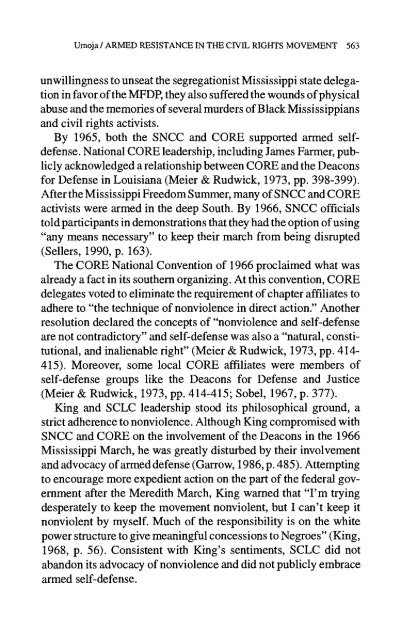MXGM Self-Defence Manual
MXGM Self-Defence Manual
MXGM Self-Defence Manual
Create successful ePaper yourself
Turn your PDF publications into a flip-book with our unique Google optimized e-Paper software.
Umoja / ARMED RESISTANCE IN THE CIVIL RIGHTS MOVEMENT 563<br />
unwillingness to unseat the segregationist Mississippi state delegation<br />
in favor of the MFDP, they also suffered the wounds of physical<br />
abuse and the memories of several murders of Black Mississippians<br />
and civil rights activists.<br />
By 1965, both the SNCC and CORE supported armed selfdefense.<br />
National CORE leadership, including James Farmer, publicly<br />
acknowledged a relationship between CORE and the Deacons<br />
for Defense in Louisiana (Meier & Rudwick, 1973, pp. 398-399).<br />
After the Mississippi Freedom Summer, many of SNCC and CORE<br />
activists were armed in the deep South. By 1966, SNCC officials<br />
told participants in demonstrations that they had the option of using<br />
"any means necessary" to keep their march from being disrupted<br />
(Sellers, 1990, p. 163).<br />
The CORE National Convention of 1966 proclaimed what was<br />
already a fact in its southern organizing. At this convention, CORE<br />
delegates voted to eliminate the requirement of chapter affiliates to<br />
adhere to "the technique of nonviolence in direct action." Another<br />
resolution declared the concepts of "nonviolence and self-defense<br />
are not contradictory" and self-defense was also a "natural, constitutional,<br />
and inalienable right" (Meier & Rudwick, 1973, pp. 414-<br />
415). Moreover, some local CORE affiliates were members of<br />
self-defense groups like the Deacons for Defense and Justice<br />
(Meier & Rudwick, 1973, pp. 414-415; Sobel, 1967, p. 377).<br />
King and SCLC leadership stood its philosophical ground, a<br />
strict adherence to nonviolence. Although King compromised with<br />
SNCC and CORE on the involvement of the Deacons in the 1966<br />
Mississippi March, he was greatly disturbed by their involvement<br />
and advocacy of armed defense (Garrow, 1986, p.485). Attempting<br />
to encourage more expedient action on the part of the federal government<br />
after the Meredith March, King warned that "I'm trying<br />
desperately to keep the movement nonviolent, but I can't keep it<br />
nonviolent by myself. Much of the responsibility is on the white<br />
power structure to give meaningful concessions to Negroes" (King,<br />
1968, p. 56). Consistent with King's sentiments, SCLC did not<br />
abandon its advocacy of nonviolence and did not publicly embrace<br />
armed self-defense.


